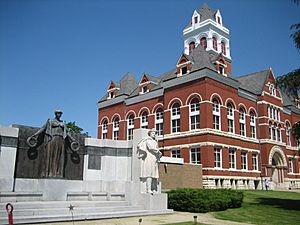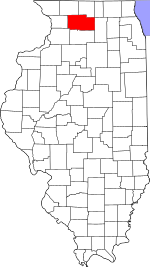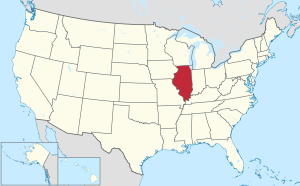Ogle County, Illinois facts for kids
Quick facts for kids
Ogle County
|
|
|---|---|

|
|

Location within the U.S. state of Illinois
|
|
 Illinois's location within the U.S. |
|
| Country | |
| State | |
| Founded | January 16, 1836 |
| Named for | Joseph Ogle |
| Seat | Oregon |
| Largest city | Rochelle |
| Area | |
| • Total | 763 sq mi (1,980 km2) |
| • Land | 759 sq mi (1,970 km2) |
| • Water | 4.4 sq mi (11 km2) 0.6% |
| Population
(2010)
|
|
| • Total | 53,497 |
| • Estimate
(2018)
|
50,923 |
| • Density | 70.11/sq mi (27.071/km2) |
| Time zone | UTC−6 (Central) |
| • Summer (DST) | UTC−5 (CDT) |
| Congressional district | 16th |
Ogle County is a county in the northern part of the U.S. state of Illinois. According to the 2010 United States Census, it had a population of 53,497. Its county seat is Oregon, and its largest city is Rochelle. Ogle County comprises Rochelle, IL Micropolitan Statistical Area, which is also included in the Rockford-Freeport-Rochelle, IL Combined Statistical Area.
Contents
History
Ogle County was formed in 1836 out of Jo Daviess and LaSalle counties, and named in honor of Captain Joseph Ogle, a veteran of the Revolutionary War who came to Illinois in 1785. Ogle did not have an organized government until 1837, so for a year it remained attached to Jo Daviess County. The county was divided three years later in 1839, when Lee County was formed.
Ogle County was a New England settlement. The original founders of Oregon and Rochelle consisted entirely of settlers from New England. These people were "Yankees", that is to say they were descended from the English Puritans who settled New England in the 1600s. They were part of a wave of New England farmers who headed west into what was then the wilds of the Northwest Territory during the early 1800s. Most of them arrived as a result of the completion of the Erie Canal. When they arrived in what is now Ogle County there was nothing but a virgin forest and wild prairie, the New Englanders laid out farms, constructed roads, erected government buildings and established post routes. They brought with them many of their Yankee New England values, such as a passion for education, establishing many schools as well as staunch support for abolitionism. They were mostly members of the Congregationalist Church though some were Episcopalian. Culturally Ogle County, like much of northern Illinois would be culturally very continuous with early New England culture, for most of its history.
Geography
According to the U.S. Census Bureau, the county has a total area of 763 square miles (1,980 km2), of which 759 square miles (1,970 km2) is land and 4.4 square miles (11 km2) (0.6%) is water.
Climate
| Weather chart for Oregon, Illinois | |||||||||||||||||||||||||||||||||||||||||||||||
|---|---|---|---|---|---|---|---|---|---|---|---|---|---|---|---|---|---|---|---|---|---|---|---|---|---|---|---|---|---|---|---|---|---|---|---|---|---|---|---|---|---|---|---|---|---|---|---|
| J | F | M | A | M | J | J | A | S | O | N | D | ||||||||||||||||||||||||||||||||||||
|
1.6
26
10
|
1.4
32
15
|
2.6
44
27
|
3.6
58
37
|
4.3
70
48
|
4.9
79
58
|
3.5
82
62
|
4.5
80
60
|
3.3
73
51
|
2.7
62
39
|
2.8
45
28
|
2.1
31
17
|
||||||||||||||||||||||||||||||||||||
| temperatures in °F precipitation totals in inches source: The Weather Channel |
|||||||||||||||||||||||||||||||||||||||||||||||
|
Metric conversion
|
|||||||||||||||||||||||||||||||||||||||||||||||
In recent years, average temperatures in Oregon have ranged from a low of 10 °F (−12 °C) in January to a high of 82 °F (28 °C) in July, although a record low of −27 °F (−33 °C) was recorded in January 1999 and a record high of 110 °F (43 °C) was recorded in July 1936. Average monthly precipitation ranged from 1.43 inches (36 mm) in February to 4.88 inches (124 mm) in June.
Adjacent counties
- Winnebago County - north
- Boone County - northeast
- Stephenson County - northwest
- DeKalb County - east
- Carroll County - west
- Lee County - south
- Whiteside County - southwest
Demographics
| Historical population | |||
|---|---|---|---|
| Census | Pop. | %± | |
| 1840 | 3,479 | — | |
| 1850 | 10,020 | 188.0% | |
| 1860 | 22,888 | 128.4% | |
| 1870 | 27,492 | 20.1% | |
| 1880 | 29,937 | 8.9% | |
| 1890 | 28,710 | −4.1% | |
| 1900 | 29,129 | 1.5% | |
| 1910 | 27,864 | −4.3% | |
| 1920 | 26,830 | −3.7% | |
| 1930 | 28,118 | 4.8% | |
| 1940 | 29,869 | 6.2% | |
| 1950 | 33,429 | 11.9% | |
| 1960 | 38,106 | 14.0% | |
| 1970 | 42,867 | 12.5% | |
| 1980 | 46,338 | 8.1% | |
| 1990 | 45,957 | −0.8% | |
| 2000 | 51,032 | 11.0% | |
| 2010 | 53,497 | 4.8% | |
| 2018 (est.) | 50,923 | −4.8% | |
| US Decennial Census 1790-1960 1900-1990 1990-2000 2010-2013 |
|||
As of the 2010 United States Census, there were 53,497 people, 20,856 households, and 14,711 families residing in the county. The population density was 70.5 inhabitants per square mile (27.2/km2). There were 22,561 housing units at an average density of 29.7 per square mile (11.5/km2). The racial makeup of the county was 93.2% white, 0.9% black or African American, 0.5% Asian, 0.2% American Indian, 3.8% from other races, and 1.4% from two or more races. Those of Hispanic or Latino origin made up 8.9% of the population. In terms of ancestry, 38.0% were German, 15.3% were Irish, 10.2% were English, 6.4% were American, 5.3% were Swedish, and 5.3% were Norwegian.
Of the 20,856 households, 33.1% had children under the age of 18 living with them, 56.1% were married couples living together, 9.7% had a female householder with no husband present, 29.5% were non-families, and 24.5% of all households were made up of individuals. The average household size was 2.54 and the average family size was 3.01. The median age was 40.7 years.
The median income for a household in the county was $55,733 and the median income for a family was $64,927. Males had a median income of $49,996 versus $32,082 for females. The per capita income for the county was $24,959. About 6.6% of families and 8.9% of the population were below the poverty line, including 12.4% of those under age 18 and 5.9% of those age 65 or over.
Transportation
Major highways
 Interstate 39
Interstate 39 Interstate 88
Interstate 88 U.S. Highway 51
U.S. Highway 51 U.S. Highway 52
U.S. Highway 52 Illinois Route 2
Illinois Route 2 Illinois Route 26
Illinois Route 26 Illinois Route 38
Illinois Route 38 Illinois Route 64
Illinois Route 64 Illinois Route 72
Illinois Route 72 Illinois Route 110
Illinois Route 110 Illinois Route 251
Illinois Route 251
Airports
The following public-use airports are located in the county:
- Ogle County Airport (C55) - Mount Morris, Illinois
- Rochelle Municipal Airport (RPJ) - Rochelle, Illinois
Recreation
Parks
- Castle Rock State Park
- Lowden State Park
- Lowden-Miller State Forest
- Sinnissippi Farms
- Weld Park
- White Pines State Park
Nature Preserves
- Beach Cemetery Prairie Nature Preserve
- Douglas E. Wade Prairie Nature Preserve
- Jarrett Prairie Nature Preserve
- Nachusa Grasslands
Communities
Cities
Villages
Census-designated places
Townships
- Brookville Township
- Buffalo Township
- Byron Township
- Dement Township
- Eagle Point Township
- Flagg Township
- Forreston Township
- Grand Detour Township
- Lafayette Township
- Leaf River Township
- Lincoln Township
- Lynnville Township
- Marion Township
- Maryland Township
- Monroe Township
- Mount Morris Township
- Oregon-Nashua Township
- Pine Creek Township
- Pine Rock Township
- Rockvale Township
- Scott Township
- Taylor Township
- White Rock Township
- Woosung Township
Economy
By 2000, 65% of the county labor force was employed as white-collar workers with an increase of 20 points in comparison with 1990 statistics. Manufacturing remains the leading employment sector absorbing more than 21.7% of the labor force though there was a decrease from 30,4% in 1995. However it is expected that services would replace manufacturing starting 2015 as the leading activity.
Agriculture remains important in Ogle county, mainly corn and soybeans. In 2003, the Illinois Department of Agriculture ranked Ogle County 17th in the State for crop cash receipts, and 14th in the state for livestock cash receipts. As for livestock production, hogs and pigs are still leading even though productions decreased from 57,000 units in 1998 to 48,900 in 2002.
The county also got some investment packages such as a $180 million truck-to-train cargo hub in 2006. In August 2006, it was announced that a new ethanol production facility would receive a package of $5.5 million Opportunity Returns grant from the State.
See also
 In Spanish: Condado de Ogle para niños
In Spanish: Condado de Ogle para niños



